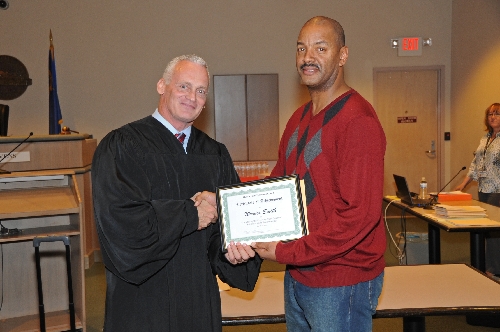Specialty program at the Henderson Municipal Court gives veterans a second chance

The Veterans Court at the Henderson Municipal Court helps defendants who might have committed misdemeanor crimes because of problems readjusting to life after returning home from military service.
“A lot of them have just fallen on hard times,” said Judge Mark Stevens, who oversees the court. “We help get them back on track to be productive citizens again. The goal is to give them a fresh start — a hand up.”
There currently are 15 people going through the program. Some participants are Vietnam veterans, while others have returned recently from Afghanistan.
“We have more people pending right now (to enter the program),” Stevens said.
The program started in June 2011 and has had its first success story. Warner Smith graduated from the court March 22.
Even though the program is supposed to take about a year, Smith’s program was expedited so he could be deployed back to Afghanistan.
“He had already completed everything,” Stevens said. “He just needed to continue to stay out of trouble. It is incredible.”
More veterans are expected to graduate in June or July.
“It is amazing the discipline they have,” Stevens said. “All of them have taken the program and ran with it. They come back in two weeks and already have completed 48 hours community service.”
The concept came about in 2009 during the Nevada legislative session when the idea to have a specialty court catering to veterans was approved. But Stevens said other court systems haven’t adopted this specialty court yet, making Henderson Municipal Court the first.
Phil Dunleavy, an attorney at the Henderson Municipal Court, read about a similar concept. The article outlined the principles of a veterans-centered court.
“Many of these guys come back, and all their crimes seem to be related to their experiences,” Dunleavy said. “Many of them had no priors.”
Dunleavy then approached Stevens with the idea. Stevens worked with the attorneys and other city staff members to make this concept a reality.
Stevens and Dunleavy, both veterans, said they know what it is like to readjust after serving
The court focuses on the underlying issues that might have caused the veteran to commit crimes.
Stevens said both the prosecution and the defense attorneys work together to determine what is in the best interests of the defendant.
“Normally you have the public defender, or defense attorney, whose goal is to minimize any kind of punishment,” Stevens said. “Then you have the prosecution, whose goal is justice and to punish, as well. In this court, that’s not necessarily the goal. Both sides work together. They look at what is in the best interest of the veteran to try to get him back on track and healthy so he is not committing crimes.”
The Department of Veterans Affairs assesses each person to determine his eligibility for the court.
Stevens said the type of offenses range from driving under the influence to domestic battery.
“Most of them are first-time offenders,” Stevens said.
No matter the crime, the victims must give their approval before anyone enters the program.
“Victims have rights, too,” Stevens said.
The program is catered toward each veteran’s need whether it is court-ordered counseling, Veterans Affairs-recommended counseling for post-traumatic stress disorder or any drug or alcohol addiction counseling.
“Each person is different,” Stevens said.
But all have to want to be in the program.
“I’m not going to force it on anybody,” Stevens said.
Because most of the veterans already have a structured background due to their military service, once given a chance to set their lives straight, participants go above and beyond to complete their tasks, Stevens said.
“I have only had to come down hard on a couple people,” Stevens said.
Stevens said the veterans already in the program are the ones who give the new participants the hardest time about getting their acts together.
Once veterans complete the court and remain in compliance with everything in the program, their record is sealed.
“That’s their goal, to get (their record) dismissed and get healthy along the way,” Stevens said. “This way their misdemeanor won’t haunt them in the future. If not, they are going to have a conviction on their record.”
Currently, people involved in facilitating the program do it on a volunteer basis — there has been no grant money filtered into Veterans Court.
Stevens said he hopes to apply for grants in the future.
Contact Henderson/Anthem View reporter Michael Lyle at mlyle@viewnews.com or 387-5201.